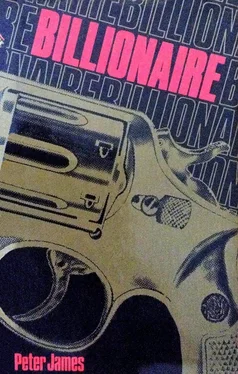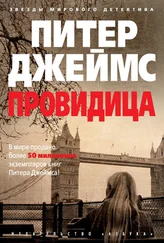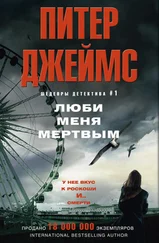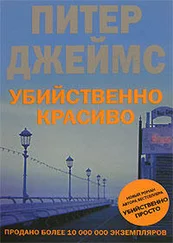Rocq got back into the Renault. He wasn’t enjoying his day out in Switzerland any more. He wanted to go home, and quickly. He carried on down, and eventually came out into the small village of Riddes. He wondered where he could find a policeman, then decided that, with his limited grasp of the French language, he was not quite sure how he would be able to explain why it was that he had found it necessary to steal a car and race a Range Rover up and down a mountainside. He looked at his Piaget watch; there was a plane back to London at 3.30. If he hurried he might just make it.
He passed a garage, but decided not to risk stopping; with all its dents, the car looked much too conspicuous.
He drove out of Riddes; a number of people, mainly children, shouted to each other and pointed at the smashed-in side of the car. He decided it would not be wise to stay in the car longer than was absolutely necessary and, when he came down into Martigny, he abandoned it in the first empty parking bay he saw, and took a taxi to Geneva Airport.
It was not until the Caravelle was airborne that Rocq began to unwind a little. He was still trembling, and wasn’t sure whether it was fear or rage. He ordered a Bloody Mary from the stewardess and then sat back to try and think clearly.
It was possible that it had been mistaken identity, but he discounted that. Four people knew he was going to Verbier: Elleck, Theo, Amanda and the avocat . Amanda he could discount. Which left three. Had he perhaps been conned into signing his life away to Theo and the avocat ? Possibly, but he couldn’t believe his Italian friend was ruthless enough to have anyone murdered. There was only one person that he knew who he believed could be capable of murdering, or of having people murdered: Elleck. And yet, that didn’t make sense. He hadn’t even begun the buying yet for Elleck’s syndicate, and Elleck could hardly think it worthwhile having him bumped off just for his signatures — unless there was some immensely clever stunt Elleck had pulled; but he doubted it. He thought about the syndicate. Elleck had said little to him about his partners, but in Rocq’s view, any syndicate that was capable of setting off a chain of events that could, as Elleck had said, bring the world to the brink of war, was more than capable of ordering the bumping off of one solitary metal broker.
Rocq’s drink arrived; he put it down on the table and stirred it slowly, then took a large sip. There was something going on with this syndicate, he decided, that Elleck hadn’t mentioned. There were three reasons, he decided, why he might not have mentioned it: because he didn’t want Rocq to know; because he had forgotten; or because he himself did not know.
No one had ever tried to kill Rocq before, and he didn’t like the feeling one bit. Warning bells were ringing inside him, based on a cross between a hunch and the influence of many books he had read and films he had seen, that, having tried once and failed, whoever it was would almost certainly be going to try again. The two men in the Range Rover were almost certainly dead. News of their deaths would not filter back to whoever had given them their instructions for several hours, at the very earliest. During that time, it would be presumed that they had succeeded and that Rocq was dead. He decided it would be tomorrow, at the earliest, before they came looking for him again. By then, he intended to have wrung the truth out of Monty Elleck’s fat little neck.
The Monday following Rocq’s trip to Geneva was a blazing hot summer’s day, without exception right across Europe. There was plenty to do for the estate workers at Chateau Lasserre and it was this, coupled with the general feeling of lethargy that the heat brought about, combined with the thick summer foliage, that enabled the two men at the edge of the dense L-shaped forest, to work quietly and unspotted.
The men had in the woods two large reels, around which were wound lengths of wire flex and to which were attached, at twenty-foot intervals, light bulb sockets. Alongside the edge of the trees, so close that many of the sockets almost nestled against the roots, they laid one wire, 600 metres long and coming to a halt just in front of the L-part of the forest. As they unwound the wire, they placed a 150-watt light bulb into each socket.
When they had laid the full length, they repeated the process with the second wire, laying the trail of lights parallel, twenty feet apart. Then they connected the ends of the two wires into a junction box and connected that into the mains electricity supply of Chateau Lasserre, via a power cable that traversed the estate. When they had finished, it was seven o’clock in the evening.
Eight hundred kilometres away, in Switzerland, Viscomte Lasserre and Jimmy Culundis waited their turn on the Eighteenth green at Crans Montana Golf Club. The Viscomte was looking grim. He had lost the game at the Eleventh, and he was now one down on the bye; the best he could hope for was to halve it. The foursome in front of them appeared to be inspecting the borrow of every blade of grass. Lasserre was anxious to finish as he had a long flight back home, and unlike the Greek, he did not have the luxury of a personal private pilot.
‘Tell me, Claude,’ said Culundis, ‘you are really sure you trust that man Elleck?’
‘Jimmy — I am not going to risk 500 million francs of my own money on someone I don’t trust. He knows best — because he is the best.’ He leaned over towards Culundis conspiratorially. ‘I am reliably informed that he has investment portfolios for many of the English Royal Family.’
‘So what does that signify?’
‘It signifies, Jimmy, that he is a man who can be trusted.’
Culundis grunted. ‘I wonder what’s happened to the gold price this afternoon? He told you it was going down today; well, by lunch time it was up to $650 — it closed Friday at $625. In my language that’s up, not down.’
Lasserre nodded. ‘Look at those people,’ he said, almost exasperated. The four players had placed ball-markers down, and were now cleaning their balls and arguing about something at the same time. He turned to Culundis. ‘He assured me he would buy today — regardless of what happened.’
‘If he had bought last week, at four hundred and ninety-four, do you realize how much we would have made? We wouldn’t have needed this whole damned business with Amnah.’
‘If we could foretell what was going to happen in the markets, we’d be playing with gold golf balls, Jimmy.’
‘It doesn’t look good, Claude; I don’t like it. I think it’s Elleck who has caused this price rise. Look, it’s just too much coincidence: except in the Osirak crisis, the gold price does not move for eighteen months; then, the week we talk with him about doing something about it — bang — it goes through the roof. Surely to God, that is a little strange?’
‘What are you suggesting, Jimmy — you want to pull out?’
‘I think we’re crazy to stay in — we’re being taken for the biggest ride of our lives.’
‘Look at him,’ shouted Lasserre in frustration. ‘A ten-centimetre putt — how can anyone miss a ten-centimetre putt? I shall have him thrown out of this club!’
‘Did you hear what I said, Claude?’
‘Sure, I heard. What are you going to do with your 100 Israeli sailors that are sitting this moment in the docks at Al Suttoh?’
‘Who gives a shit about them? Take them out and drown them — or give them back. What does it matter?’
‘It matters a lot, Jimmy. I need that money; we have planned this carefully, it is all going according to plan. Why the hell should we pull out now?’
‘The plan was to force up the price of gold and make a killing. Someone — or something — has already forced the price up, and you and I are not on that boat — although I’ll bet your friend, Mr Elleck, is.’
Читать дальше











![Питер Джеймс - Искушение [litres]](/books/423638/piter-dzhejms-iskushenie-litres-thumb.webp)
![Питер Джеймс - Wish You Were Dead [story]](/books/430350/piter-dzhejms-wish-you-were-dead-story-thumb.webp)